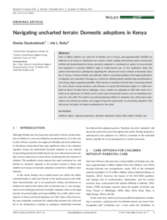The qualitative study in this article explores adoptions in Kenya: its motivations and barriers and if an increase in domestic adoptions would be in a child’s best interest. The exploratory study set out to answer four questions:
- What are the prevalent societal perceptions and beliefs regarding domestic adoption of children in Kenya, as experienced by the study participants?
- What are some factors influencing Kenyans to adopt a child?
- What are some barriers preventing Kenyans from adopting children? And
- In the current societal and cultural context of Kenya as indicated by the study, should the government continue to promote domestic adoptions?”
A total of 21 participants were interviewed using a purposive snowballing sampling method and separate, open-ended interview questionnaires were developed.
Regarding societal perceptions, the study found only adoptive parents and adoptions professionals had a clear understanding that adoption involved the termination of parental rights and the full acceptance of rights and responsibilities by the adoptive family. Respondents reported negative societal perceptions on adoptions, wherein those who adopted were considered childbearing failures. Blood lineage is a primary reason for adoption resistance. Sometimes children who are adopted may not be considered a full member of the family by the extended family system, causing some to adopt children in secret. The inheritance system also prefers blood relatives. As such, the authors note “… a prevailing attitude that formal adoptions are not compatible with the Kenyan culture.”
The main factors that motivate Kenyans to adopt are a) infertility; b) practicalities of kinship care; and c) charitable motive. The authors note an adoption society professional who stated that 75% of local parents adopt due to infertility. A sense of charity or religious belief motivates some adopters. Some find it to be a more practical way to handle insurance issues, etc.
Barriers that prevent Kenyans from adopting include: a) cultural beliefs and social practices leading to discrimination; b) resistance to formalizing informal care; c) freedom to terminate the relationship; d) costs and corrupt practices; and e) controversy over adoption certificate.
The authors note relatively few couples in Kenya opt for domestic adoptions in the current context. There is a significant amount of stigma associated with adoption but respondents believe perceptions will get better with time. The study finds that “a convincing argument can be made that family-based care within the child’s own culture is a better option than residential care or placement outside the country. However, literature in Africa urges careful consideration of cultural resistance to adoption.”

